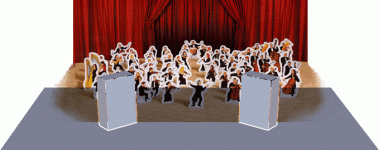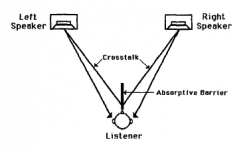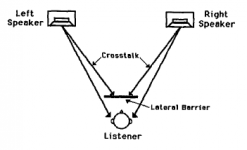Melo,
That sounds interesting in itself but your premise that an omni speaker actually would work is not in itself true either. To say that all instruments create a simple equal sound in all directions is again to simple. An acoustic guitar held against the body wouldn't radiate that way and the sound board and sound hole would project more forward than back, a horn player is very direct sound out of the front of the horn than being omni, the vocals from a singer again are more directional than that and we can hear when someone is singing at rather than away from us. So you would need a speaker that would radiate the same as the real instrument, not a simple directional or omni source. Each speaker would have to have a steerable radiation pattern.
Microphone captures captures sound from single point perspective. Reconstruction of captured sound by speaker should then also be from a single point perspective. This doesn't limit speaker to being omnidirectional, just to all sound radiating from speaker projecting back to a point.
Barleywater,
You can never win that argument with fas42, he always throws that comment in wherever he goes that it is the electronics making the real difference or the system. The oft said comment that when the electronics are perfect that even a mediocre set of speakers will sound fantastic is his creed. I find that statement incredible each and every time I hear it, that you can make a crude speaker system sound great with any electronics just doesn't align with what I have ever heard. To me a middle of the road speaker can never sound better than it does, no amount of electronic finesse ever can correct for a poor frequency response or pattern control, you just can't get there from here. But a great sounding speaker can sound fairly incredible even with mediocre electronics some times, the real magic these days is on the speaker side, electronics even in most consumer electronics can convey the music with great speakers. Sorry Frank, but I have to keep disagreeing with you each time you make that statement.
Yeah, I've picked up on that. I'm not arguing on this one, just facts. Speaker are greatest single variable in playback chain.
Barleywater,
Again I sincerely disagree with the statement that a point source is always the correct way of looking at this. A piano is not a point source, the sound is emanates from a large area if it is an acoustic grand piano, the sound board and strings are distributed and a point source does not convey that very well. That is the same for many instruments, the radiation patterns are often spread out over an area much more than a single point source, perhaps a singer could fit that bill, but many instruments need a larger sound source than a point to sound real.
Again I sincerely disagree with the statement that a point source is always the correct way of looking at this. A piano is not a point source, the sound is emanates from a large area if it is an acoustic grand piano, the sound board and strings are distributed and a point source does not convey that very well. That is the same for many instruments, the radiation patterns are often spread out over an area much more than a single point source, perhaps a singer could fit that bill, but many instruments need a larger sound source than a point to sound real.
Melo,
That sounds interesting in itself but your premise that an omni speaker actually would work is not in itself true either. To say that all instruments create a simple equal sound in all directions is again to simple. An acoustic guitar held against the body wouldn't radiate that way and the sound board and sound hole would project more forward than back, a horn player is very direct sound out of the front of the horn than being omni, the vocals from a singer again are more directional than that and we can hear when someone is singing at rather than away from us. So you would need a speaker that would radiate the same as the real instrument, not a simple directional or omni source. Each speaker would have to have a steerable radiation pattern.
Yes, I hear what your saying and I thought of that as well. I suggest omni's to give a "they are here" presentation. That's the purpose of recording each musician in a non-reverbiant room, so that the reflections of your own room are the only reflections. It's not perfect in regards to recreating perfect wave propagation, but you will have that same problem with a two channel set up.
The main benifit of this approach is to eliminate crosstalk problems, and not just for 1 person....for everybody in the room.
That's OK, Kindhornman ... as Pano points out, it's all about what one's experiences have been: if you've only heard "magical" sound with highly developed or refined speakers then the assumption, the logic will automatically follow that this is a necessary condition. I was fortunate enough to have had my first good experience with relatively ordinary speakers, hence wasn't handicapped with the need to believe in the specialness of the speakers. In fact, when I first experienced optimum sound I went in into a bit of a mad frenzy, visiting every hifi shop and sound place I could, to see if the experience was replicable. Failure followed failure followed failure, it was really surprising how mediocre the "best" speakers sounded in the context of the systems driving them. Only in the home of the Sydney audio "guru" of the time, with some of the most expensive equipment you could buy, highly tweaked by the enthusiastic owner, did I get some of the better sound I was looking for ...Sorry Frank, but I have to keep disagreeing with you each time you make that statement.
Thus, the concept of specialness of the equipment has never played a part in my thinking.
And, key to better sound is low distortion - not FR, directionality, and all the other conventional attributes of speakers. I was listening to the MBL 101E speakers, through the top of the line MBL electronics, and after some minutes could hear distortion starting to creep into the sound, some aspect of the setup was possibly suffering interference, there was a "problem" somewhere. Once you become attuned to this type of degradation it becomes easy to pick up its signature ...
Frank
Instead of a motorbike, I wanted a stereo! So I went to the shop, and I got
my second hand equipment....all american! A Marantz 1122DC and a pair
of Allison Four. A Thorens TD 160 was already at home. Later I bought a second hand tape deck....guess ? A B.I.C. ! After 3 year of honorable work, I
substituted the speakers with a fresh new pair of Infinity RS 4000.
I rely on you, ( american) guys !



my second hand equipment....all american! A Marantz 1122DC and a pair
of Allison Four. A Thorens TD 160 was already at home. Later I bought a second hand tape deck....guess ? A B.I.C. ! After 3 year of honorable work, I
substituted the speakers with a fresh new pair of Infinity RS 4000.
I rely on you, ( american) guys !
Soundtrackmixer, you can keep telling us its not possible, but I have heard it. With stereo. The room really does go away, and you really are transported elsewhere. I have never heard it again, not on my system, not at RMAF or at BAF, or on other highly directional systems. The effect was so startling that it is burned in my memory.
I'll give you the example of one recording (there were many we heard that day). It was a solo cello recorded in a highly reverberant, large space. The recording is available on npr, if only I can find it. On all other speakers, it sounds good but the space is not quite conveyed. On Pano's, it was totally different. You were in row 10, and you could point to the cello with the sound of the hall coming through perfectly. And it was unshakable too. You could move (slightly), but not shake away the illusion.
Put a door in front of you and there you have it. Play "Empire Brass in Japan". Amazing depth.
I had similar perception with speakers directly at the side walls with an opening angle of about 90°. It's probably as simple as attenuating the confusing cues from interaural crosstalk.
P.S. Picture is from an Bock/Keele AES preprint.
Attachments
How does one set up their speakers to get this effect?
I would like to know that too. I even specifically asked Pano, no answer yet. All we know is that "it takes rather heroic means". Whatever that means.
John - define "reality" if you will.
Reality is the best illusion of them all.
Nope, reality is a process still under construction.
Each person constucts his/her reality basing on his/her way of sensing, so also emotionally, with a kind of culture, tastes etc etc.
Reality displayed by an equipment for reproducing music has the same type of problems we may encounter.
After having resolved the technical issues, there's still the problem of acquiring those informations.
Those are relatively slowly propagated waves thru the air and happen to be a succession of single bits of information, which is the music itself, so the sound is the process, and like a sequence, our brain plays also some predictive work.
Each person constucts his/her reality basing on his/her way of sensing, so also emotionally, with a kind of culture, tastes etc etc.
Reality displayed by an equipment for reproducing music has the same type of problems we may encounter.
After having resolved the technical issues, there's still the problem of acquiring those informations.
Those are relatively slowly propagated waves thru the air and happen to be a succession of single bits of information, which is the music itself, so the sound is the process, and like a sequence, our brain plays also some predictive work.
Last edited:
I could be a little naughty, and use the analogy of a generalised computer system. One could say that the only thing that really matters is how well the reporting module works: that one has myriads of options with sorting, subtotalling, everything that opens and shuts in terms of how precisely one can format the output, on the finest quality paper, with myriads of colours, fonts, styles -- how well the earlier processing actually selected the data to be processed and then applied business rules and such to assemble the details for the reporting module is relatively a minor point ... so long as what comes out of the paper looks spectacularly impressive that's all that really matters ...  ,
, 
Frank
Frank
Back with a bong! ( Murphy's law....well, not classical music, but....)
Maya (illusion) - Wikipedia, the free encyclopedia
Maya (illusion) - Wikipedia, the free encyclopedia
I've tried to visualize the stereo impression that I can get in my room with good recordings:

Grey is (The front part of) my room floor with the speakers >1m off any walls. The recorded space "intrudes" somewhere behind the speakers and can easily fill the complete width of the front wall - if the recording allows so. If I close my eyes I can make the front wall disappear completely. Still I am sitting in an extra loge which is not part of the recorded space.
I can literally walk into that loge by increasing the D/R ratio (sitting closer to the speaker base line). At the same time the recorded space becomes more detailed. Not exactly as detailed as in my illustration, but to some extent. There may be some sound effects from the sides or even the back (when provided by the recording), but there is no continuous recorded impression of space in this loge. I'ts still just my room.
The illusion works best, when the sweet spot has become very narrow.
Rudolf

Grey is (The front part of) my room floor with the speakers >1m off any walls. The recorded space "intrudes" somewhere behind the speakers and can easily fill the complete width of the front wall - if the recording allows so. If I close my eyes I can make the front wall disappear completely. Still I am sitting in an extra loge which is not part of the recorded space.
I can literally walk into that loge by increasing the D/R ratio (sitting closer to the speaker base line). At the same time the recorded space becomes more detailed. Not exactly as detailed as in my illustration, but to some extent. There may be some sound effects from the sides or even the back (when provided by the recording), but there is no continuous recorded impression of space in this loge. I'ts still just my room.
The illusion works best, when the sweet spot has become very narrow.
Rudolf
Rudolf, try the barrier technique. You'll get the "you are there" impression.
Instead of a door, why not use a mattress? Less added reflections that way. You could even use a king size one!
Instead of a door, why not use a mattress? Less added reflections that way. You could even use a king size one!
A board is probably easier to handle and mattresses have unknown properties. An absorptive board would be best but absorption isn't that critical, non-transmissiveness is.
A board is probably easier to handle and mattresses have unknown properties. An absorptive board would be best but absorption isn't that critical, non-transmissiveness is.
Have you experimented with RACE software to eliminate the need for the door? You're about halfway there on your way to Ambiophonics
An externally hosted image should be here but it was not working when we last tested it.
- Home
- Loudspeakers
- Multi-Way
- Linkwitz Orions beaten by Behringer.... what!!?


